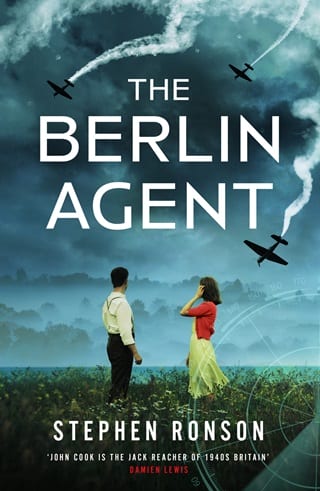2
Palehouse Lane was three miles north of town. One of those turn-offs from the London road before it climbed up to the high, open expanse of Ashdown Forest. I’d driven past it a thousand times and never taken it. We took the turning and the lane dipped, around a sharp bend, and then over a ford, where a stream bubbled across the road.
‘What happens when the water’s higher?’ I asked, as we splashed through the ford.
‘We stay at home.’
It was the most she’d said for the whole ten-minute journey. I’d tried my silent treatment, known to work on surly farm labourers and Tommies alike. Most people don’t like silence. Keep quiet long enough and they’ll start talking to fill the void. Tell you what’s on their mind. Seemed Mrs Leckie was made of sterner stuff. Probably knew what I was up to. Probably planning a quick thank you and goodbye at the garden gate, before scurrying into the house, back to Stan. Planning her apology for leaving him alone. Fetch his tea and his paper.
We left the ford behind and headed on, through thicker woodland, around winding turns. Through the open -window I heard the roar of an engine and slowed, forcing my aging delivery van onto the grass verge. Lucky I did. A large lorry roared around the corner in the middle of the road. He swerved when he saw me but didn’t slow, roaring past me with inches to spare, a slew of sand and earth thrown onto the road and clattering against my van.
The lorry was gone in an instant, hurtling around the bends I’d navigated, the driver obviously familiar with the contours of the road.
‘Maniacs,’ she said, anticipating my question. ‘Night and day, back and forth.’
The lane ran on for another mile. Longer than I’d imagined, taking us deeper into a wooded valley I’d never known existed. I kept an eye out for her house. I predicted a short terrace of farmworkers’ cottages. Two up, two down, dark brick, damp.
We took a sharp right-hand turn, and the road headed upwards, like running straight up a cliff. The engine in the old van complained and I had to drop down through the gears, all the way to first. Trees crowded the road and then suddenly we were clear of them, like surfacing from the sea, onto an island of heath. The sky was vast and blue, with only a few contrails. The day’s dog-fighting hadn’t kicked off.
Mrs Leckie nodded towards a small cottage as we approached, at the apex of the hill. Black timbers and white plaster. Laburnum blooming around the door. And all around it, the huge blue sky, like a massive dome covering slopes of purple heather and distant clumps of trees that looked like toys on a child’s train set.
There was a sandy layby across the road from the house, and I pulled into it, the engine running fast after its exertion getting up the hill. Mrs Leckie tensed as we slowed, checking the surroundings with quick, darting looks. Like somebody about to go into battle, doing their reconnaissance, assessing likely sources of danger. She gripped the door handle, ready for a quick exit.
‘I’ll walk you to the door,’ I said.
‘No need,’ she said, opening the door before I’d stopped the van. I stood on the brakes, didn’t want her killing herself jumping out of a moving vehicle after I’d been so gallant about bringing her home. The van slid on the white sand, then she was out.
I climbed out and caught up.
‘You’ve got to go,’ she said, looking up and down the road as if she were crossing a city street, rather than an empty country lane at the top of a forgotten hill in the middle of nowhere.
‘I want to make sure you’re going to be OK. Don’t want you getting any more bruises.’
She slipped through the garden gate and pulled it closed behind her, putting a barrier between us.
‘Please,’ she said.
She left me there and hurried to the front door, fumbling in her bag.
I watched her at the door, scratching at the lock with her key. Not a practised manoeuvre. Not the way you’d do it if you’d unlocked the door every day of a long life. I looked around. Good visibility in every direction. Probably one or two houses further along the lane, or wherever the lorry had come from, then a dead end. No strangers. Probably lived here for decades without locking the door. Never needed to. Until now.
Put the locked door together with her nervous threat assessment as we’d approached the house, and I had to consider I’d been wrong. Perhaps Stan wasn’t the problem.
I opened the gate and strode to the front door. She got it open and hurried inside, but I got my boot in before she could slam it shut.
‘What’s going on?’ I asked.
She looked at me, blocking her door. She was terrified, her eyes darting past me to the lane.
She thought she had a decision to make. Ask me to help, or turn me away. But there was no decision required. She needed my help, so she was going to get it.
 Fullepub
Fullepub 



